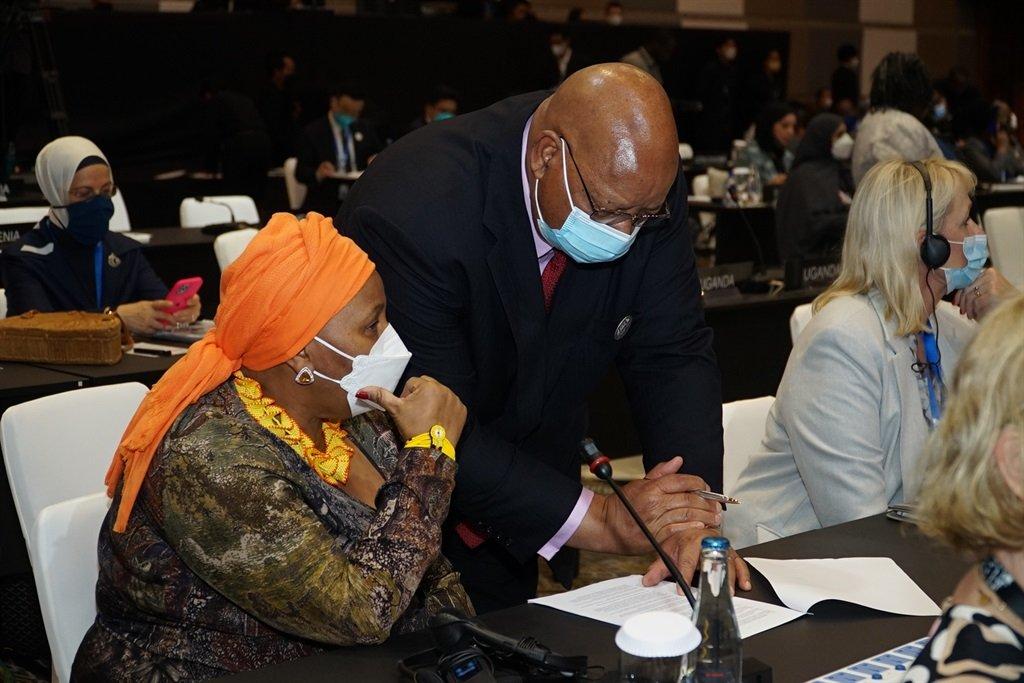Africa-Press – South-Africa. Russian President Vladimir Putin can continue to count on South Africa as one of the few countries refusing to condemn his deadly invasion of Ukraine.
In the latest instance, a delegation from the South African Parliament on Wednesday distanced itself from an international resolution stating that “the ongoing Russian use of force against Ukraine is a violation of the Charter of the United Nations, including the principle of sovereignty and territorial integrity”.
The Inter-Parliamentary Union (IPU), at its Assembly in Nusa Dua, Indonesia, adopted a resolution for the peaceful resolution of the war in Ukraine, respecting international law, the Charter of the United Nations and territorial integrity.
The resolution notes with concern that the war in Ukraine threatens global security, with potential global economic uncertainties in the future.
It calls on all IPU Member Parliaments to support efforts to deescalate tensions, reads a statement from the IPU.
It appeals to MPs from the Russian Federation and Ukraine, both IPU Members, “to promote initiatives to cease hostilities and resolve differences through peaceful, diplomatic means”.
The resolution notes that, “on 24 February 2022, the Russian Federation launched a full-scale military attack invading the sovereign nation of Ukraine and its people”.
It further expresses grave concern about “the threat to global peace and security posed by the decision to order Russian nuclear forces onto a special regime of operation and a ‘high alert’ level of readiness, and noting the urgency for the Russian Federation to withdraw this threat and refrain from making such threats”.
The resolution also notes that “the Russian Federation has committed an act of aggression that may constitute a violation of a fundamental rule of international law”.
Russia-Ukraine: Speaker Mapisa-Nqakula toes the party line at international event
According to the IPU, the resolution is strong in placing the IPU as a potential platform for peace through mechanisms such as a dedicated task force made up of parliamentarians representing the different geopolitical groups at the IPU.
It also calls on IPU Member Parliaments to facilitate humanitarian assistance to those fleeing this war; and for the full and equal participation of women in the peace dialogues between parliamentarians of both countries.
South Africa joined Bahrain, Belarus, China, Iran, the Syrian Arab Republic, United Arab Emirates, Vietnam, and Zimbabwe in expressing their reservations about the resolution.
A total of 178 countries’ parliaments are represented at the IPU. Russia boycotted this assembly after the IPU condemned its invasion of Ukraine in a strongly-worded statement.
The IPU assembly will conclude on Thursday, when it will adopt resolutions.The South African Parliament delegation to the IPU includes Speaker Nosiviwe Mapisa-Nqakula, NCOP deputy chairperson Sylvia Lucas, National Assembly House chairperson Cedric Frolick, ANC deputy chief whip Doris Dlakude, ANC MP Fikile Masiko, DA MP Annelie Lotriet, and EFF chief whip Floyd Shivambu.
Shivambu objected on the South African delegation’s behalf because they were concerned that certain clauses of the resolution would jeopardise the IPU’s role and obligation as an impartial mediator for a peaceful solution to the conflict. He said:
“What is of matter is the fact that they are objectionable and will weaken the integrity of the IPU in mediating on the conflict between Russia and Ukraine,” said Shivambu, who recently expressed his support for Russia in a debate in the National Assembly.
“To wholly say that the Russian Federation is using artillery and missiles to destroy civilians populations, it is using missiles to destroy medical units and personnel, will not be an adequate basis for a mediation.”
He said the Russian Federation would express a view that the IPU had already passed judgment on its activities.
“We cannot be forced to be part of a master narrative that reinforces the views of certain countries, particularly in Western Europe and the United States of America.”
According to a statement from Parliament, Mapisa-Nqakula and other speakers, through the General Assembly Secretariat, expressed a formal objection to the characterisation of the decision reached on the resolution as consensus.
“We have stated from the onset that this resolution is divisive, condemnatory, accusatory and may further inflame tensions and escalate an already worsening situation. We have expressed objection to certain parts of this resolution, and therefore, this must be recorded; there was no consensus,” said Mapisa-Nqakula.
“Parliament continues to be concerned about the conflict, which threatens global peace, security and economy, and has called for the immediate cessation of hostilities through dialogue, mediation and negotiations,” reads Parliament’s statement.
For More News And Analysis About South-Africa Follow Africa-Press






